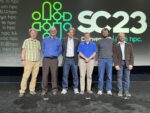“Exascale’s New Frontier,” a project from the Oak Ridge Leadership Computing Facility, explores the new applications and software technology for driving scientific discoveries in the exascale era. The Scientific Challenge Gauging the likely impact of a warming climate on global and regional water cycles poses one of the top challenges in climate change prediction. Scientists […]
Exascale’s New Software Frontier: LatticeQCD for Particle Physics
“Exascale’s New Frontier,” a project from the Oak Ridge Leadership Computing Facility, explores the new applications and software technology for driving scientific discoveries in the exascale era. The Science Challenge One of the most challenging goals for researchers in the fields of nuclear and particle physics is to better understand the interactions between quarks and gluons — […]
Exascale’s New Software Frontier: SLATE
“Exascale’s New Frontier,” a project from the Oak Ridge Leadership Computing Facility, explores the new applications and software technology for driving scientific discoveries in the exascale era. Why Exascale Needs SLATE For nearly 30 years, scores of science and engineering projects conducted on high-performance computing systems have used either the Linear Algebra PACKage (LAPACK) library […]
LLNL-led SCREAM Team Clinches Inaugural Gordon Bell Prize for Climate Modeling
A Lawrence Livermore National Laboratory (LLNL)-led effort that performed an unprecedented global climate model simulation on the world’s first exascale supercomputer has won the first-ever Association for Computing Machinery (ACM) Gordon Bell Prize for Climate Modelling, ACM officials announced Thursday. The Simple Cloud Resolving E3SM Atmosphere Model (SCREAM) team, led by LLNL staff scientist Peter Caldwell and […]
A New Day for the TOP500: Aurora No. 2 at 585 PFlops, 4 New Top 10 Entrants, Frontier Still No. 1
Denver — Attendees at the SC23 conference here in Denver have been greeted by a roiled TOP500 ranking of the world’s most powerful supercomputers, along with significant news about a would-be exascale HPC system coming in at no. 2 on the list….
@HPCpodcast: Views and Insights on the New TOP500 List
The big news on the Monday of each annual Supercomputing Conference is the release of the new TOP500 ranking of the world’s most powerful supercomputers. At this years SC23 here in Denver, the big news is that the top 10 of this year’s list has more changes than any list in recent memory….
Frontier and the Oak Ridge Team are Celebrating Exascale Day
Exascale computing is transforming our ability to solve some of the world’s most difficult and important problems. On October 18, the US Department of Energy’s (DOE’s) Oak Ridge National Laboratory (ORNL) is celebrating the fifth National Exascale Day. The holiday was created in 2019 as an initiative of DOE’s Exascale Computing Project (ECP) and Cray, […]
Exascale Day 2023: The Exascale Computing Era Is Here.
With the delivery of the U.S. Department of Energy’s (DOE’s) first exascale system, Frontier, in 2022, and the upcoming deployment of Aurora and El Capitan systems by next year, researchers will have the most sophisticated computational tools at their disposal to conduct groundbreaking research. Exascale machines can perform more than a billion billion calculations per […]
Building a Capable Computing Ecosystem for Exascale
With ECP, working together was a prerequisite for participation. “From the beginning, the teams had this so-called ‘shared fate,’” says Siegel. When incorporating new capabilities, applications teams had to consider relevant software tools developed by others that could help meet their performance targets, and if they didn’t choose to use them….
EXAALT-ing Molecular Dynamics to the Power of Exascale
As part of the Exascale Computing Project (ECP), a collaborative team of scientists, software developers, and hardware integration specialists from across the Department of Energy (DOE) has developed the Exascale Atomistics for Accuracy, Length, and Time (EXAALT) application to bring molecular dynamics (MD) into the exascale era. Danny Perez, a physicist within the Theoretical Division at Los Alamos National Laboratory and the project’s principal investigator says, “We’ve implemented new scalable methods that allow us to access as much of the accuracy, length and time space as possible on exascale machines by rethinking our methods and developing algorithms that go around some of the bottlenecks that limited scaling previously.” Such a capability has potential to revolutionize MD.











